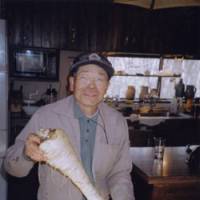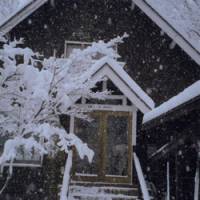I was down in Kyushu with some Japanese friends last year, just sipping a few drinks and chatting. The conversation turned to kabu and became very serious and somewhat gloomy. Quite honestly, I wasn't really following it all, but I felt I had to put in my two-pennies' worth.
"Oh,"I said, "up in Nagano our forester Mr. Matsuki and I had a lot of bad luck with our kabu last year. There was too much rain in midsummer and they got a sickness that made them rot inside. It's going to be better this year though, especially with the rutabagas and parsnips — they're doing fine."
My friends' faces went blank, and then one began to laugh. The "kabu" that they were all talking about referred to stocks and shares. I was talking about "kabu" meaning root crops — turnips, parsnips, swedes and such.
"You live in a different world Nic," my friends said.
People used to talk about the weather, and everybody could have a say; now the media especially blabbers on incessantly about this vague thing called "the economy" — and blames everything on it.
Well, I have never invested in stocks, shares, bonds or whatever, and could muster little interest in, or sympathy for, my friends' gloomy feelings. Mr. Matsuki, my staff and I at our Afan Woodland Trust in Kurohime do invest in the future though, in a simple but positive way; a way in which we can see, stock up on, and share the results.
Parsnips, for example. You just can't buy them in shops around here, and what few I've seen in Tokyo are expensive and puny. Our Kurohime parsnips are magnificent, big and sweet — and we've enough not only to last through the winter, but also to share with (mostly British) friends who want them.
Then we have what as a boy we called swedes, but which are elsewhere called rutabagas. These are large, yellow-fleshed turnips. Ours are as big as a human head and, if boiled, mashed and served with a knob of butter and a dash of salt and pepper, are delicious. Mrs. Matsuki makes a special kind of Japanese pickle with them.
This year we finally had success with Brussels sprouts, a food that I prefer to, well, truffles maybe?
Mr. Matsuki grows all these and many other vegetables in land that I bought some years ago after it had been unused for decades. The land is incredibly rich, and not soaked with pesticides. We can grow most of our own onions, leeks, peppers, cucumbers, potatoes, eggplants, daikon (radish), tomatoes and so on. It doesn't take a huge investment in money, just in time.
Recently I released a little book in Japan advocating the much wider use of venison. Truly accurate figures are hard to get, but at least 100,000 deer are killed by hunters in Japan every year and thrown away. For various reasons, deer, wild boar and monkeys are on the increase and doing huge damage to fields, paddies, orchards and forests. They absolutely must be culled.
I never buy beef for the home. I'll eat it if someone gives me some, but chez Nicol we use venison. Venison can be used in all the recipes that normally call for beef. We go for roasts, fillet steaks, stew, curries, hamburgers, sausages, meat sauces etc.
Just before Christmas this year, a hunter friend brought me three deer. He shoots them, then bleeds and guts them in the mountains. He brings me the whole animal, with the skin on. If they're not damaged, he also brings the heart, kidneys and liver. I skin, butcher and bag. Three deer will give me approximately 300 venison meals. I know I can get that many because I have recorded how, when and with whom the venison was used. I'll probably get just one more deer before the season ends, then my two big freezers in the basement will be full.
Mr. Matsuki got two wild boar early in the season this year, and shared them with me. Wild boar meat is very different from venison, and far fattier. But it's delicious and superior, as far as I'm concerned, to domestic pork. The year 2007 was a bumper year for oak acorns, and the wild boar did very well, with quite a lot of acorns lasting through the winter. More young boar survived and were really fit and able to travel and forage. Acorns make their fat so succulent!
Another wild treat we had at the end of the year was carp. In Britain when I was growing up, carp was looked down on as a food fish, and it wasn't until I first traveled in the mountains of Japan that I tasted carp that had been raised in clean mountain water. It was firm, delicious and not in the least bit "muddy" to taste.
In order to improve habitat in our woods we have dugs ponds and cleared out little streams. Ponds attract ducks, herons, kingfishers, frogs, newts and all kinds of aquatic insects. In a 480-meter stretch of new stream bed that we dug we had 22 species of dragonflies colonize within three years.
When I dug our older ponds almost 20 years ago, they were quickly also colonized by small funa (crucian carp; Carassius cuvieri) the eggs of which, I am told, probably arrived stuck to the legs of ducks and herons. A friend put in some larger koi (common carp; Cyprinus carpio) and they multiplied.
This last year was the third time we emptied the two earlier and larger ponds in order to clear out an excess of waterweeds (which make excellent fertilizer for trees) and reduce the numbers of fish (which muddy the waters and change the biology a bit too much). The carp, big and small, were measured and then eaten. I got a huge big one on a very busy day. It had to be dealt with fresh so I made a fish curry with it — enough for 12 people and absolutely excellent.
With food and fuel rising in price,I would suggest to anybody wishing to go on living in Japan who is not afraid to get their hands dirty, and has the necessary patience and inclination, to try country life. With modern communications you can be in your own study, yet face-to-face and voice-to-voice with people pretty well anywhere in the world. You could have a small office in town, but live in the country. Even with rising food prices there is a surprising amount of arable land that you can borrow, if not buy. Food may be easy to pick up from a supermarket, but it is never as good, nor as much fun. Schools? Kids raised in the country in Japan get to go to university too you know.
Nowadays especially, it makes more sense to me to plant edible kabu rather than to waste money investing in the ephemeral, ethereal or simply dubious kabu of the present economy, whatever that is. (And I haven't even begun to boast of this heavenly black cordial we make with wild mountain cherries, black Okinawa sugar and awamori white liquor!)





















With your current subscription plan you can comment on stories. However, before writing your first comment, please create a display name in the Profile section of your subscriber account page.